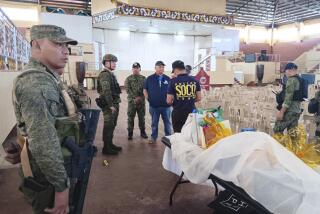Rome Huddles Over Bomb Puzzle : Italy: Suspects in blast range from terrorists to the Mafia to ‘dark forces’ seeking destabilization.
- Share via
ROME — While Italians wondered Saturday whether terrorists had joined their national debate on political reform, investigators probing the rubble of a major bombing in the heart of Rome found more potential culprits than solid clues.
International terrorists, the Mafia trying to kill a TV talk show host nearly claimed by the blast, and “dark forces” seeking to destabilize Italy at a trying political moment were all listed among the might-be bombers Saturday in a city stunned by the attack.
The bomb Friday night in the swank Parioli residential section of the city injured about two dozen people, severely damaged two schools, neighborhood shops, about 100 apartments in six buildings, and destroyed 50 cars, by police count Saturday.
The blast of at least 22 pounds of high explosives dug a deep crater on Ruggero Fauro Street, hurled twisted auto body panels into nearby trees and blew out windows for blocks around. Only the location of the blast--on a side street--and the timing--9:40 p.m. on a Friday night--prevented major loss of life, police said.
It was not clear if the bomb was remote-controlled or fired by a timer. The Parioli district and its apartment houses are home to many middle- and upper-class Italian families, as well as to the villas of foreign embassies, including the American ambassador’s residence. No embassies are near the blast site, though, and no prominent or politically sensitive Italians live in the buildings nearest to it.
In a country where nerves are badly frazzled by unprecedented scandal and the uncertain outcome of a quest for political change, the mystery bombing sounded shrill bells.
Who did it? What was the target?
Italy is no stranger to terrorism: its own for political or criminal reasons, or that inspired by conflict in a volatile region. An Iranian exile leader was murdered as he drove to work earlier this year.
Saturday, explosives experts plucked dented hubcaps from fifth-floor balconies and prowled a shrapnel-scarred street in northern Rome that overnight had come to look more Bosnian than Italian.
Indeed, Italian state television reported that police had received a number of dubious claims of responsibility by callers saying they represented Bosnian Serbs. Italy is a springboard for NATO enforcement of the U.N. “no-fly” zone in Bosnia, and last week a Bosnian Serb leader was quoted as threatening Italy with a missile attack in the event of a widened conflict.
More likely, in the view of some observers, is that the bomb was planted by some Mafia clan in an attempt against television personality Maurizio Costanzo, who often inveighs against organized crime in his nightly talk shows. Organized crime has suffered a historic series of reverses at the hands of Italian police in the past year, and on Friday, Interior (Police) Ministry Nicola Mancino warned that the Mafia might be preparing a counterattack.
The bomb exploded not far from the Parioli Theater, which Costanzo had just left after recording his Friday night show. His chauffeur-driven car, followed by a car carrying two bodyguards, had turned a corner a few seconds before and was shielded by a school when the blast came. One of the bodyguards in the second car was injured by flying debris, police said.
Costanzo doubted that he was a Mafia target: “I don’t think I’m so important,” he said.
Last year, underworld assassins killed Italy’s two leading anti-Mafia judges in bombings in Sicily, one in a car and one in a culvert that was exploded by remote control as the judge’s car crossed it.
Without discounting possible Mafia involvement in Friday’s attack, investigators nevertheless noted that the Sicilian bombs employed a plastic explosive, not the sort used in the Parioli attack, and were planted and triggered with great precision against carefully selected targets.
The “dark forces” theory, in contrast, argues that the blast was random, the work of Italian terrorists seeking to unsettle the country at an already rocky moment. More than 3,000 businessmen and political figures have been implicated in an institutionalized bribes and kickback scandal of huge and nationwide proportions.
The political crisis deepened Saturday when an official of the former Communist Party was arrested on corruption charges in Milan, and, in Rome, the leader of the renamed party’s left wing resigned in Marxist righteousness.
Public fury at mainline political parties that shared power while profiting from corruption for decades has sparked national demand for electoral reforms aimed at ending the clubby system of weak coalition governments under which Italy has been ruled since World War II.
More to Read
Sign up for Essential California
The most important California stories and recommendations in your inbox every morning.
You may occasionally receive promotional content from the Los Angeles Times.













